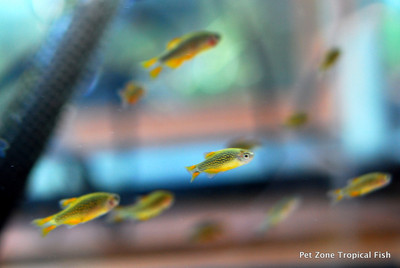Galaxy Rasbora
Posted by Max Gandara on on 30th Nov 2023
The Galaxy Rasbora (Danio margaritatus), also known as the Celestial
Pearl Danio or Microrasbora sp. "Galaxy," is a captivating and
relatively small freshwater fish that has gained popularity among
aquarium enthusiasts. This species was first discovered in 2006 in the
small ponds and rice fields of Myanmar, making it a relatively recent
addition to the aquarium trade.
The Galaxy Rasbora is celebrated for its stunning appearance despite its
small size. Adults typically reach lengths of about 0.6 to 0.8 inches
(1.5 to 2 centimeters). Their body is adorned with vibrant iridescent
colors, featuring a metallic blue-green hue with orange and red
markings. The striking contrast and intricate patterns resemble a
celestial galaxy, hence the common name.
Creating an optimal environment is crucial for the well-being of Galaxy
Rasboras. They thrive in planted aquariums with subdued lighting,
simulating their natural habitat. A tank size of at least 10 gallons is
recommended for a small group of these rasboras. Fine-grained substrate,
live plants, and floating vegetation provide hiding spots and mimic the
conditions of their native environments.
Maintaining stable water conditions is essential for the health and
vibrancy of Galaxy Rasboras. They prefer slightly acidic to neutral
water with a pH range of 6.0 to 7.0. The water temperature should be
kept between 73 and 79 degrees Fahrenheit (23 to 26 degrees Celsius).
Regular water changes are beneficial to ensure optimal water quality.
Galaxy Rasboras are omnivores, and in captivity, they accept a variety
of foods. High-quality micro-pellets, small live or frozen foods like
daphnia and brine shrimp, and finely crushed flakes are suitable
choices. A varied diet contributes to their overall health and
encourages their vibrant colors.
These rasboras are known for their peaceful nature, making them
excellent community tank inhabitants. They thrive when kept in schools
of at least six individuals, and their schooling behavior enhances the
visual appeal of the aquarium. They are compatible with other small,
non-aggressive species that share similar water parameter requirements.
Breeding Galaxy Rasboras in captivity can be challenging due to their
specific requirements. A separate breeding tank with densely planted
areas, fine-leaved plants, and floating vegetation is recommended. The
presence of moss or spawning mops provides suitable locations for egg
deposition. After spawning, adults may consume their eggs, so it's
common practice to remove them to a separate tank.
Galaxy Rasbora stands out as an exquisite and visually captivating
addition to freshwater aquariums. With attention to their specific care
needs and a well-designed environment, these rasboras can thrive and
contribute to the aesthetic appeal of planted community tanks.

